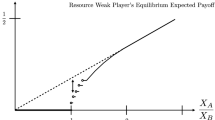Abstract
In this paper, we evaluate in the context of weighted (j, k)-simple games, the maximal degree of perturbations which may be allowed, in voters weights and/or in the quotas, without changing the structure of the game. For this purpose, we extend on (j, k)-simple games the notion of amplitude well known for ordinary simple games. Recall that, (j, k)-simple games provide a model of decision making in which each voter has j levels of approval (inputs), while k levels of approval are permitted as collective decision (outputs). Here, the j inputs are qualitatively ordered, same are the k outputs. Ordinary simple games correspond to the particular case \(j=k=2\). Our results generalize those obtained by Freixas and Puente (Qüestiió 23(1):43–60, 1999) on ordinary simple games. We illustrate by computing the amplitude of some real world examples like the United Nations Security Council which is a (3, 2)-simple game.
Similar content being viewed by others
References
Andjiga NG, Chantreuil F, Lepelley D (2003) La mesure du pouvoir de vote. Math Sci Hum 163:111–145
Banzhaf J (1965) Weighted voting dosen’t work: a mathematical analysis. Rutgers Law Rev 19:317–343
Coleman J (1971) Control of Collectivities and the Power of a Collectivity to Act. In: Lieberman B (ed) Social Choice. Gordon and Breach, New York, pp 269–300
Colomer JM (1996) Measuring parliamentary deviation. Eur J Political Res 30:87–101
Deegan J, Packel EW (1978) A new index of power for simple \(n\)-person games. Int J Game Theory 7:113123
Diffo Lambo L, Moulen J (2001) Quel pouvoir mesure-t-on dans un jeu de vote. Math Sci Hum 152:27–47
Diffo Lambo L, Moulen J (2002) Ordinal equivalence of power notions in voting games. Theory Decis 53:313–325
Felsenthal DS, Machover M (1997) Ternary voting games. Int J Game Theory 26:335–351
Fishburn PC (1973) The Theory of Social Choice. Princeton University Press, Princeton
Freixas J (2005a) The Shapley–Shubik power index for games with several levels of approval in the input and output. Dec Support Syst 39:185–195
Freixas J (2005b) The Banzhaf power index for games with several levels of approval in the input and output. Ann Oper Res 137:45–66
Freixas J, Molinero X (2008) The greatest allowed relative error in weights and threshold of strict separating systems. IEEE Trans Neural Netw 9(5):770–781
Freixas J, Puente A (1999) Amplitude of weighted majority game strict representations. Qüestiió 23(1):43–60
Freixas J, Tchantcho B, Tedjeugang N (2014) Voting games with abstention: linking completeness and weightedness. Dec Support Syst 57:172–177
Freixas J, Zwicker WS (2003) Weighted voting, abstention, and multiple levels of approval. Soc Choice Welf 21:399–431
Freixas J, Zwicker WS (2009) Anonymous yes-no voting with abstention and multiple levels of approval. Games Econ Behav 69:428–444
Houy N, Zwicker WS (2014) The geometry of voting power: weighted voting and hyper-ellipsoids. Games Econ Behav 84:7–16
Hu S (1965) Threshold logic. University of California Press, Berkeley
Isbell R (1958) A class of simple games. Duke Math J 25:423–439
Rubinstein A (1980) Stability of decision systems under majority rule. J Econ Theory 23:150–159
Shapley LS, Shubik M (1954) A model for evaluating the distribution of power in a commitee system. Am Political Sci Rev 48:787–792
Taylor AD, Zwicker WS (1993) Weighted voting, multicameral representation, and power. Games Econ Behav 5:170–181
Taylor AD, Zwicker WS (1999) Simple games. Princeton University Press, Princeton
Tchantcho B, Diffo Lambo L, Pongou R, Mbama Engoulou B (2008) Voters’ power in voting games with abstention: influence relation and ordinal equivalence of power theories. Games Econ Behav 64:335–350
Tomiyama Y (1987) Simple game, voting representation and ordinal power equivalence. Int J Policy Inf 11:67–75
Acknowledgements
We thank two anonymous referees, whose comments have deeply improved the quality of this paper. We thank Nicolas Gabriel Andjiga, Bertrand Tchantcho, Louis-Aimé Fono, Issofa Moyouwou, and seminar participants at the research team of Social Sciences Mathematics at the University of Yaounde 1 for their comments and discussions.
Author information
Authors and Affiliations
Corresponding author
Additional information
Publisher's Note
Springer Nature remains neutral with regard to jurisdictional claims in published maps and institutional affiliations.
Rights and permissions
About this article
Cite this article
Mbama Engoulou, B., Diffo Lambo, L. Amplitude of weighted representation of voting games with several levels of approval. Int J Game Theory 48, 1111–1137 (2019). https://doi.org/10.1007/s00182-019-00696-y
Accepted:
Published:
Issue Date:
DOI: https://doi.org/10.1007/s00182-019-00696-y




